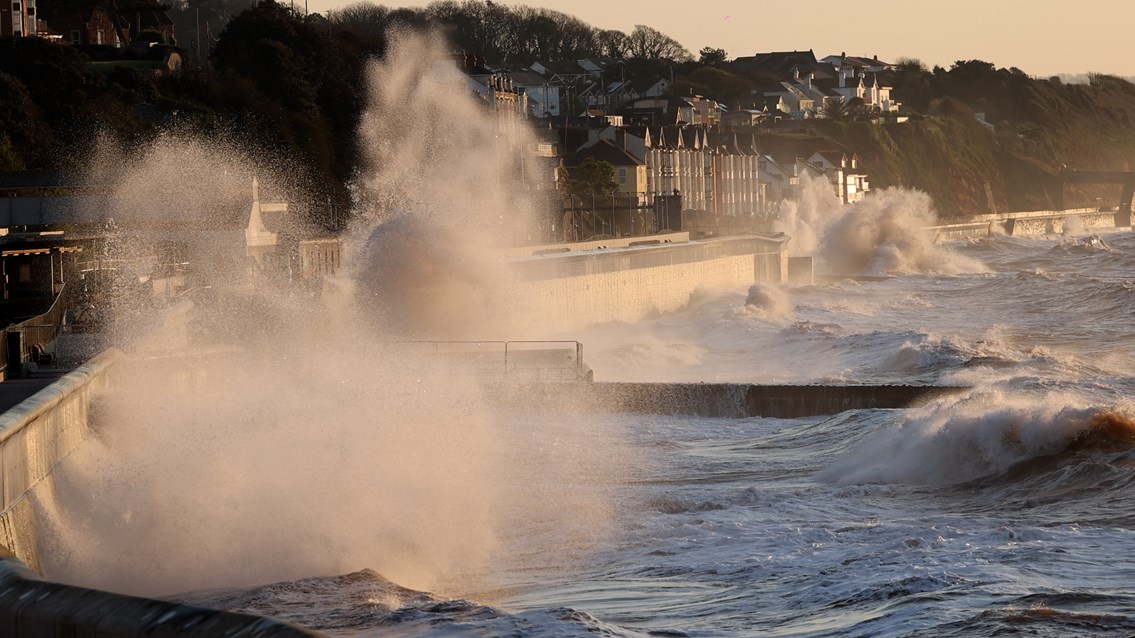Thursday 30 Nov 2023
Network Rail releases footage of Dawlish sea wall withstanding this month’s Storm Ciarán as the project scoops the top prize at annual awards ceremony
- Region & Route:
- Wales & Western: Western
- | Wales & Western
Earlier this month the new Dawlish sea wall faced its toughest test yet as devastating wind and waves whipped the south west, withstanding both and winning two engineering awards just days later.
Five metre waves at high tide. Wind speeds of over 80mph. Driving rain. All of it unusually coming from the east, a constellation of weather conditions that were exactly the same as those of the infamous storm of 2014, which destroyed part of the railway in Dawlish and left the south west inaccessible by train and cut off from the rest of the UK.
This time, as Storm Ciarán swept the country earlier this month, the Devon coastal town was protected by a new sea wall, an £82m investment in protecting the railway which held up against severe weather conditions. The wall was designed to deflect large waves back to the sea and that’s exactly what it did.
At 8m – 2.5m taller than the previous one – the new wall was completed in two sections between May 2019 and May 2023, following years of detailed studies, designs and joint working between world-leading marine, coastal and railway engineering experts. It was developed as part of the South West Rail Resilience Programme, put in place to improve resilience between Exeter and Newton Abbot, after the major storm of 2014.
Just days after Storm Ciarán exposed the structure to its toughest challenge yet, the team that developed and built the wall won two prestigious awards at the annual ICE South West Civil Engineering Awards. The second phase of the project took home the top Showcase Award, as well as the Over £8m Re-engineered Award.
Ewen Morrison, Network Rail senior programme manager, said: “We’re delighted that the sea wall has been recognised with these two awards.
“When the forecast for Storm Ciarán came in, we knew it would be a test for the railway in Dawlish and it’s incredible to see how the wall performed against some very rough weather conditions. It’s a testament to all the hard work that the teams have put in over the years to ensure that this coastal stretch of the railway is more resilient to extreme weather.
“I’d like to thank everyone who has been part of this project, including our suppliers, and especially the local community. Residents in Dawlish have been incredibly patient and supportive while construction was ongoing and they have welcomed us to their town with open arms.”
Rail Minister Huw Merriman said: “The Dawlish sea wall was delivered through £82 million of Government funding and just a few months later that has already helped protect our rail network from Storm Ciarán.
“I’ve seen first-hand the Dawlish sea wall and the importance of our investment to protect this vital coastal rail route from extreme weather conditions.
“This is a true example of civil engineering at its finest and has rightly received prestigious awards. I commend everyone who has worked on this project for its successful delivery.”
Huw Jones, executive director BAM, said: “We're pleased to see the wall performing as designed in recent weeks when faced with some exceptionally high winds and stormy conditions. Our work at Dawlish will protect the railway and the town for the next hundred years, so I'm sure Storm Ciarán will be the first of many.
“Dawlish was an example of exceptional collaboration, drawing on expertise from Network Rail, BAM and our outstanding suppliers. It's great to see that their work has been rightly acknowledged in recent awards."
The sea wall was not the only Network Rail resilience project recognised by the ICE South West Civil Engineering Awards. The Severn Estuary Resilience Programme, which aims to reduce landslips on the line between Gloucester and Newport, scooped the Resilience Award.
It was given in recognition of the first phase of work, carried out in 2022, when engineers removed more than 15,000 tonnes of material from a steep cutting near Lydney in the Forest of Dean. Teams on ropes then installed around 27,000 square metres of mesh, secured by 1,000 soil nails to help stabilise the cutting face.
Work on a three-mile stretch of railway will continue until 2026, helping to protect the vital passenger and freight link from extreme weather for years to come.
Notes to Editors
Photo credit: Coast Cams (https://coastcams.com)
Contact information
Passengers / community members
Network Rail national helpline
03457 11 41 41
Latest travel advice
Please visit National Rail Enquiries
Journalists
Emily Maiden
Network Rail
Emily.Maiden@networkrail.co.uk
About Network Rail
We own, operate and develop Britain's railway infrastructure; that's 20,000 miles of track, 30,000 bridges, tunnels and viaducts and the thousands of signals, level crossings and stations. We run 20 of the UK's largest stations while all the others, over 2,500, are run by the country's train operating companies.
Usually, there are almost five million journeys made in the UK and over 600 freight trains run on the network. People depend on Britain's railway for their daily commute, to visit friends and loved ones and to get them home safe every day. Our role is to deliver a safe and reliable railway, so we carefully manage and deliver thousands of projects every year that form part of the multi-billion pound Railway Upgrade Plan, to grow and expand the nation's railway network to respond to the tremendous growth and demand the railway has experienced - a doubling of passenger journeys over the past 20 years.
Follow us on Twitter: @networkrail
Visit our online newsroom: www.networkrailmediacentre.co.uk

